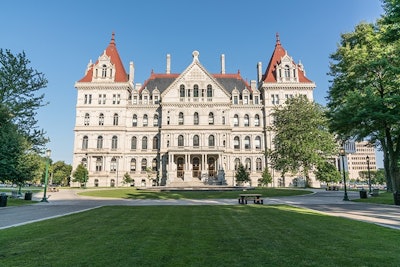
New York Gov. Andrew Cuomo has proposed a plan to legalize, tax and regulate adult-use cannabis in the state’s budget, but some lawmakers are raising concerns about the lack of racial and social equity provisions in the proposal.
Cuomo’s plan would cap the number of cultivation, distribution and retail licenses allowed in the state and prohibit vertical integration for businesses. Regulation and licensing of the new industry would occur in a proposed Office of Cannabis Management, a new state entity that would oversee the industry.
The proposal levies a 20-percent state tax and a 2-percent county tax on cannabis wholesalers, as well as a $1-per-gram flower tax and a $0.25 tax on trim for cultivators. Tax revenue would fund a state traffic safety committee, small business development and substance abuse services.
And while the proposal does include the expungement of past cannabis-related conviction records of residents, some argue this does not go far enough to ensure that minority communities reap the economic benefits of legalization.
“Ethically, we see the importance of it, but I think the question more so is will it ever be implemented, and how exactly does that come about?” said Andrew Farrior, co-founder of minority-owned Greenbox, a curated monthly cannabis subscription service launching in New York.
Bill Caruso, founding member of New Jersey United for Marijuana Reform and a partner and leading cannabis attorney for Archer & Greiner, looks to provisions in New Jersey’s legalization bill, which will receive floor votes March 25, for answers.
“In New Jersey, we’ve built a pathway forward through racial and social justice reform with organizations like New Jersey United for Marijuana Reform, led by the ACLU and the NAACP and other organizations—Drug Policy Alliance and other groups like that— … based on expungement of criminal records and fairness in the industry, and then [we thought] about making sure there’s an industry,” he told Cannabis Business Times. “The demand was for the need to address racial and social inequalities, not just to legalize cannabis.”
New York, Caruso said, approached legalization from a different standpoint. “The governor of New York, because he was vulnerable in the Democratic primary, changed his position on legalizing cannabis almost overnight, so the industry has really led the effort to push forward the legalization of cannabis and create a market, but there really hasn’t been the platform for racial and social justice, and it doesn’t look like [there is] proper vetting and inclusion in the legislation to address some of these issues. So, I think that is why you’re seeing so much pushback now because there really hasn’t been this foundation for it.”
Creating an Inclusive Industry
When the country’s legalization efforts first began, it became clear that many proposals missed the mark with racial and social justice reform, Caruso said. “When Colorado and other jurisdictions legalized, most of the industry was white. There wasn’t an attention to expunging criminal records. A lot of ex-offenders were left out of the market because they were excluded from it.”
Now, states like New Jersey are putting more of an emphasis on addressing racial and social equity, although the best approach is not always clear.
“The success of the industry is really built upon the success of how well it thrives in all communities, not just certain communities,” Caruso said. “Diversity as an economic advantage is important. But from a fairness standpoint, we have been locking up black and brown people at four times the rate that we’ve been doing so for their white counterparts, despite no difference in use … because of inherent racism. And if we’re going to start to cure some of those ills, we have to make sure we don’t continue to repeat the same process by now legalizing and shutting out those same people from the industry going forward.”
During a March 18 hearing, amendments were added to the Assembly version of New Jersey’s legalization bill to further clarify expungement and broaden its social equity policies. The proposal now includes the dismissal of all pending criminal cases involving possession of up to five pounds of cannabis, and the state will develop an expungement process with the New Jersey Supreme Court. In addition, the measure prohibits employers from considering any past cannabis convictions during the hiring process. The bill also creates an Office of Minority, Disabled Veterans and Women Business Development to promote participation of these groups in the state’s cannabis industry.
Including the expungement of low-level trafficking convictions in any sort of legalization proposal is important, Caruso said. “The premise there was, ‘Listen, if you were guilty of selling dime bags on the street yesterday and today, we’ve got a nice, glitzy storefront where it’s legal to sell, not only should you have the ability to have your record expunged, but you should be welcomed in this industry.’ In fact, if we’re going to dry up this black market, we absolutely want to include folks like that in the industry.”
New Jersey has had time to tackle these issues, Caruso added, while New York is just now starting the conversation—but it is an honest discussion, he said. “I think the problem in New York right now is a lack of education about what some of the problems are and what they look like. Jersey’s been grappling with this for some years, and I don’t think New York was prepared for it, so they’re learning. What you hear is generally the view of ‘We don’t like what we don’t see in the bill,’ but there’s not an articulation of what.”
“Automatic expungement” is a term that lawmakers have been floating, Caruso said, but in reality, expungement cannot occur with the help of the courts and other organizations that administer an expungement program.
“The concept of automatic expungement is what people are clamoring for,” he said. “You might hear that out of New York, but that requires meeting with your court [and] your judiciary, and … working with municipal courts to make sure that you can truly expunge these records, and with the employer community, too. That takes some time. It takes some work. I don’t know that they’ve done any of that yet.”
An Honest Discussion
While the fate of legalization—and the racial and social equity measures that come with it—remain unclear in New York, the conversation will certainly continue.
“I think there’s going to be a push,” Caruso said. “The governor is wisely using the budget process, which is under way in every state, and he’s going to use the pressure of the budget to help try to whip votes. I think the problem for them, though, is outside of New York City and immediate surrounding areas, the push for this gets tough. [Lawmakers] have to learn again the benefits [of legalization] and why Colorado hasn’t fallen away and California hasn’t fallen into the sea after legalizing. That work hasn’t gone on.”
And while New York’s legislature may have a long and arduous road ahead to address racial and social equity concerns in any legalization proposal, there are ways for lawmakers to help break down barriers of entry to the legal marketplace.
“It’s very difficult to write in racial set-asides or quotas into legislation without running afoul of the constitution, but there are ways you can work through setting up a commission, [building] in efforts to incentivize this in the statute and, beyond that, in the regs,” Caruso said. “I think that’s what people are clamoring for in New York and don’t see yet. I think having a robust expungement process to make sure you take care of past crimes is important to folks, and a host of other things—re-investment in the communities that are hardest hit—all matter, and if they’re absent in the final bill, there are a lot of people who feel like that’s a failure.”
For Farrior, of Greenbox, the key is helping to bring businesses to economically disadvantaged neighborhoods. Interested and qualified individuals would benefit from accelerator programs, he said, which would educate them about how to network, meet compliance requirements, scale a company and other facets that come along with operating a cannabis business.
“Most people from heavily affected areas would love to see the opportunity to build something in their community that benefits them directly. I think that should be the most important thing,” he said. “I would hate to see all these businesses pop up in Midtown and Manhattan and all these places that are already worth four times what the same apartment is worth in Canarsie. I think there should be a real concerted effort to let people in those communities build cannabis dispensaries … because everybody benefits from that."























